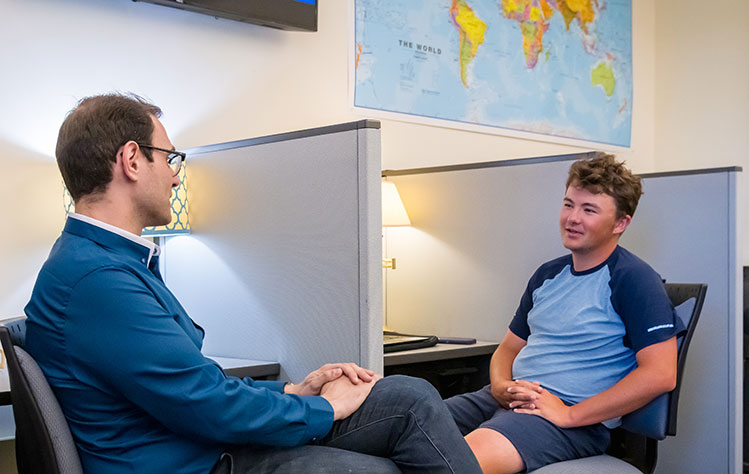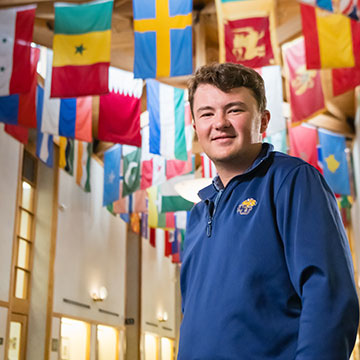Webster Student Studies the Israeli-Palestinian Conflict in the New Global Policy Horizons Lab
April 29, 2024

Professor Dani Belo (left) talks with Webster student Joshua Hayes about Hayes' research project in the Global Policy Horizons Lab.
The Israeli-Palestinian conflict has been dominating the news cycle for several months, ever since Hamas launched an attack against Israeli communities and Israel retaliated with a full-scale invasion. For many politicians and pundits, this turn of events was a surprise.
But for Webster University political science and sports communications double major Joshua Hayes, it was not a rude awakening. Hayes had already spent time in the University’s new Global Policy Horizons Lab to take a deep dive into the causes of the decades-old conflict and garner a better understanding of why it continues to this day.
“My report looks into the background of the conflict, assesses the major stakeholders, examines the risk assessment indicators present, and finally involves me using my own analysis to determine where the situation could possibly go in the future.,” Hayes said. “By awarding me a newly created scholarship for conflict resolution research, I am currently gaining valuable skills and experience researching one of the foremost challenges facing our world that will result in the publishing of my work through the lab.”

Hayes, who is also pursuing a minor in Spanish, became interested in conflict resolution while taking one of Professor Dani Belo’s classes. Because of his growing interest, Belo introduced him to the Global Policy Lab and suggested that he could turn some of his ideas into publishable research and inform the national and international policy community.
“Not many students in this field get the opportunity to work on something like this affiliated with the school,” Hayes said. “When I joined the Lab, I was not even aware of some of the opportunities it could possibly lead to.”
The Lab was launched in the fall of 2023 in Webster Hall 401 by Belo as a hub for students and faculty who are interested in international security issues. The lab has several computers that have access to numerous online databases and other information sources to help with international research.
"As a global university with campuses around the world, it only made sense that we also have a central resource where people can pursue academic research in international affairs,” Belo said. “The number of people who use the lab has been steadily growing as word of what we can now offer to our community – regardless of where they live or study – continues to spread.”
Hayes is optimistic that his project will catch the attention of other academics and policy influencers. “Professor Belo has already talked to some folks who work in government, and they have expressed interest in having me make a presentation in the near future,” Hayes said. “Without the experience and help of Professor (Dani) Belo and Webster's support for the project, it would not be possible. “
Along with a colleague at the lab, Samantha Ramay, and Belo, Hayes was invited to present his research and analysis on the Israel-Gaza conflict at the National Geospatial Intelligence Agency in June 2024.
To learn more about the lab, email danibelo@webster.edu or visit the the lab website.
